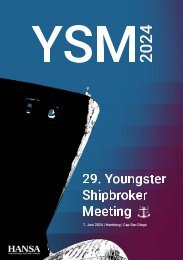HANSA 04-2024
Märkte | Versicherungen | Schifffahrt |Karriere | Schiffstechnik | Offshore | Häfen
Märkte | Versicherungen | Schifffahrt |Karriere | Schiffstechnik | Offshore | Häfen
Sie wollen auch ein ePaper? Erhöhen Sie die Reichweite Ihrer Titel.
YUMPU macht aus Druck-PDFs automatisch weboptimierte ePaper, die Google liebt.
TECH-INNOVATION POWERED BY VDMA - MARINE EQUIPMENT AND SYSTEMS<br />
SKF<br />
A strategic approach for more sustainability<br />
Due to the company SKF commitment to sustainability begins<br />
with maximizing the lifespan of maritime equipment. Therefore,<br />
SKF offers an array of condition monitoring and conditionsbased<br />
maintenance solutions such as the SKF Microlog Analyzer<br />
GX, collecting vibration data from machinery including ballast<br />
pumps, fuel oil or lube oil purifiers, and shaft generators to give<br />
and early indication of possible problems and maximize the lifespan<br />
of critical and auxiliary machinery. The data is displayed in<br />
analytical reports in the SKF One Global Cloud, ensuring information<br />
is always available to ship operators.<br />
Another way of overcoming environmental hurdles is adopting<br />
practices of a circular economy where you would see lubricants and<br />
components – like bearings, engine parts, chains, and other manufactured<br />
systems – being reused, remanufactured, recycled, and repurposed.<br />
SKF already creates a number of industrial bearings that<br />
can be retooled and sent right back into the supply chain reducing<br />
the carbon footprint compared to a new bearing by up to 90%.<br />
With 96% in CO 2 reduction SKF’s RecondOil Box shows even<br />
better results. The product features Double Separation Technology<br />
(DST), which removes nano-sized impurities from an oil<br />
and then returning the oil back into circulation. As the oil is in a<br />
closed loop, it’s kept at a highly clean state continuously<br />
Of course, using no oil at all would even be better, SKF says.<br />
Historically, the maritime sector has heavily relied on oil-based<br />
fuels and lubricants. However, goals such as UN sustainability<br />
targets and regulations set by the International Maritime Organization<br />
or US Environmental Protection Agency (VGP 2013)<br />
require ship owners and operators to focus on and investing in<br />
cleaner technologies.<br />
One eco-friendly solution for cleaner oceans is SKF’s Simplex<br />
BlueRun sterntube systems. Complying with VGP 2013 and Polar<br />
With products like »Simplex BlueRun« SKF wants his clients to become<br />
more sustainable<br />
Code the system uses water as a lubricant thereby not only helping<br />
to reduce the carbon footprint and the risk of oil spills. It also<br />
eliminates the need for storage, handling, and disposal, which is<br />
costly and time-consuming.<br />
According to SKF another non-oil-based solution to become<br />
more sustainable is to switch to electrification. While using batteries<br />
as an alternative to fossil fuels in the maritime sector might<br />
still seem challenging, electrifying critical applications can be a<br />
good start. While most fin stabilizers for example are operated<br />
electro-hydraulically, SKF offers completely electric-powered fin<br />
stabilizers for yachts. Besides the environmental and cost-saving<br />
advantages the also offer a quieter, more comfortable onboard experience<br />
for passengers and crew, SKF says.<br />
<br />
© SKF<br />
ZEPPELIN POWER SYSTEMS<br />
Solutions for less emissions<br />
Against the background of decarbo -<br />
nisation Zeppelin Power Systems is constantly<br />
expanding its range of sustainable<br />
drive and energy systems for the maritime<br />
sector: While almost all Caterpillar<br />
marine engines, from the Cat C2.2 to the<br />
Cat C280, can be equipped with an SCR<br />
system for exhaust gas aftertreatment and<br />
thus meet the IMO Tier III and EPA<br />
Tier 4 emission regulations, selected engines<br />
are even available with the EU-V<br />
emission standard (SCR/DPF).<br />
All diesel engines from Zeppelin<br />
Power Systems are available as hybrid<br />
solutions and most of them can be operated<br />
with alternative fuels in future, the<br />
company says. In addition to biodiesel<br />
and renewable diesel, this also includes<br />
HVO and, in future, methanol.<br />
Furthermore, Caterpillar, partner of<br />
Zeppelin Power Systems, sees marine<br />
batteries and shore-side charging as key<br />
components in reducing emissions in the<br />
maritime industry.<br />
Also methanol is considered a key fuel<br />
for the decarbonization of the shipping<br />
industry. By reducing nitrogen oxides<br />
and sulphur oxides as well as carbon<br />
emissions, methanol is an attractive fuel<br />
alternative to diesel. Due to its relatively<br />
high energy density, methanol is also easier<br />
to store on ships than other fuels.<br />
However, methanol is much more difficult<br />
to ignite than diesel, for example.<br />
That‘s why Caterpillar is working to<br />
identify, develop and test hardware configurations<br />
and operating strategies that<br />
can maximize the use of methanol in<br />
retrofitted engines. As early as 2022, the<br />
company announced that Cat 3500E<br />
Series marine engines can be modified to<br />
run on methanol fuel in the future. The<br />
use of methanol in four-stroke marine internal<br />
combustion engines is currently<br />
being investigated.<br />
<br />
Cat 3512E can be modified for methanol<br />
© Caterpillar<br />
<strong>HANSA</strong> – International Maritime Journal <strong>04</strong> | <strong>2024</strong><br />
71


















